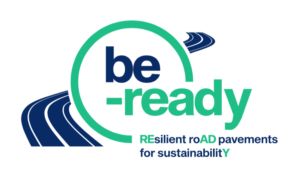- Promoter Entity COFAC – Lusófona University
- Coordinator Vítor Antunes
- Funding Institution EEA Grants
- Partners Laboratório Nacional de Engenharia Civil (LNEC), Instituto Superior Técnico (IST), Infraestruturas de Portugal (IP), Construções JJR & Filhos (JJR), Oslo Metropolitan University (OsloMet) and Viken County
- Period of funding 2022-2023
- Website be-ready.com
The Project “be-READY – REsilient roAD pavements for sustainabilitY” of Professor Vítor Antunes from the Civil Engineering Department of Lusófona University was approved.
Aligned to the Sustainable Development Goals of the United Nations and in the context of the European Green Deal, transportation infrastructures are fundamental for global development, promoting socio-economic opportunities and enabling economies to operate more competitively and with more resilience against adverse conditions. The transportation infrastructure sector, particularly in its road construction and maintenance activities, has contributed significantly to the 34% of construction and demolition waste produced, considering the total waste generated worldwide. Bituminous roads represent more than 80% of the European road network, which presently integrates around 950 billion tonnes of bituminous materials, being this a 100% recyclable material.
 Pavement asset management actors have been pursuing further sustainable solutions and practices to adopt in their construction and maintenance actions. The general approach for improving sustainability consists of reducing energy consumed, emissions generated, and the amounts of virgin material used. It means implementing preventive maintenance, lowering the bituminous mixture heat and adopting other eco-friendly pavement technologies.
Pavement asset management actors have been pursuing further sustainable solutions and practices to adopt in their construction and maintenance actions. The general approach for improving sustainability consists of reducing energy consumed, emissions generated, and the amounts of virgin material used. It means implementing preventive maintenance, lowering the bituminous mixture heat and adopting other eco-friendly pavement technologies.
The research group at ULHT has been involved in pavement research for the last nine years. On the other hand, the research group at OsloMet is preparing a master course on sustainable pavement and has been pursuing an active role in supporting the Viken County in a project to build a near to zero-emission road section and green public procurement.
Therefore, in collaboration with IST, LNEC, IP and JJR, the objectives of the proposal are: (i) update the existent specifications for the use of construction and demolition waste in road construction and maintenance; (ii) prepare a course on sustainable road design and construction, taking into consideration different climatic conditions and the extreme events (climate change and high loads); (iii) evaluate the performance of recycled pavements during the life-cycle by monitoring real road sections; (iv) calibrate models by performing Life Cycle Cost Analysis (LCCA) of sustainable and resilient pavement solutions considering the long-term performance of pavements and costs related to energy needs and greenhouse gas emissions.


 Climate Analytics has estimated that within 80 years maximum summer and autumn temperatures may increase up to 8ºC in Portugal. Also, in spring and winter temperatures may rise between 2ºC and 4ºC. The increase in urban temperature will have a major impact in buildings energy consumption and their occupants´ environmental comfort.
Climate Analytics has estimated that within 80 years maximum summer and autumn temperatures may increase up to 8ºC in Portugal. Also, in spring and winter temperatures may rise between 2ºC and 4ºC. The increase in urban temperature will have a major impact in buildings energy consumption and their occupants´ environmental comfort.

